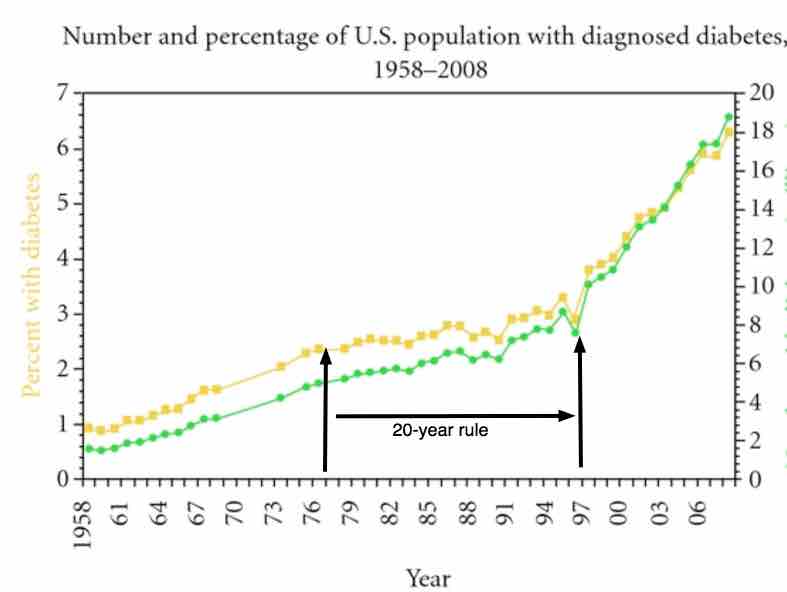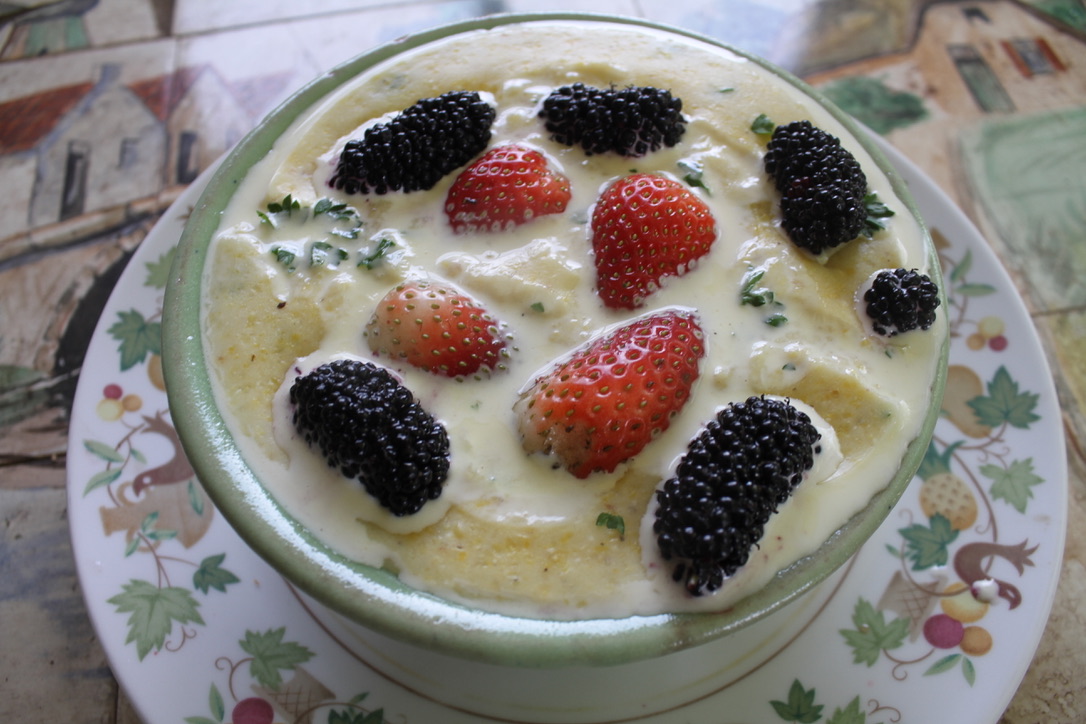- Bernard Preston homepage
- Starch
- Twenty Year Diabetes Rule
Twenty year diabetes rule
The twenty year diabetes rule of Dr George Campbell states that after two decades of consuming more than 20 teaspoons of sugar each day, around 40kg per annum, we will become type-2 diabetic.
There are around 10 tsp of sugar in a 12 oz can of Coca-Cola. There are 66 grams in one slice of chocolate cake; 15g in a typical serving of ice cream.
1 teaspoon of sugar weighs about 5 grams.
The rule is clearly greatly exacerbated by all refined carbs which break down to glucose, passing through the portal-hepatic system to the liver.
Excess glucose builds up causing fatty liver disease.
It could be 10 to 15 years if also eating a lot of cakes, white rice or refined mealiemeal.
According to The Diabetes Council the average American in 2015 was consuming 126 grams of super per day; over 25 teaspoons. And the figures continue to increase alarmingly. South Africans are unlikely to be a great deal less.

The McGovern Committee in 1977, concerned at the high rate of cardiovascular disease in the USA, recommended that Americans reduce animal fats and instead make carbohydrates the foundation of their diet.
In theory that did not sound bad; the recommendation of many authorities today continues to be the same. What they did not account for was two simple facts; the unintended consequences turned out with hindsight to have created the perfect storm.
- Unrefined carbohydrates are difficult to get; instead Americans turned to highly refined products made from cornmeal, cake flour and because they become tasteless, sugar for breakfast; cookies and colas to satisfy the 11 o'clock blues.
- Fat in the diet gives satiety to our food; Americans, constantly hungry became a nation of snackers.
Within two decades Campbell's Twenty Year Diabetes Rule swung into play.
Obesity and diabetes began to soar and continue to do so; half of Americans either have the disease or are borderline. And that applies to all those throughout the world on the typical "industrial diet" of today as it's being called.
The saccharine disease
The saccharine disease is the name given by Dr George Campbell and his colleague Thomas Cleave to those conditions associated with chronic over-consumption of refined carbohydrates; principally sugar but certainly including white rice, cake flour and mealiemeal. There are at least 220 of them.
- Type-2 diabetes
- Cardiovascular disease
- Hypertension
- Obesity
- Kidney disease
- Many others.
Twenty year diabetes rule
In 1963 Dr George Campbell, a Scottish medical doctor with degrees from Edinburgh, published his pioneering paper entitled Diabetes in Asians and Africans in and around Durban[2].
Campbell found that moving an Indian from his mother country to KZN as it is now called increased the likelihood of him developing diabetes by a massive multiple of ten. It was lifestyle, not genetic.
Per capita consumption of sugar in India was 5.4kg per annum at the time, whereas in KZN it was 35 kilogrammes.
Campbell noted that the progression of vascular disease was not strongly associated with the duration of raised blood glucose; even young Indians consuming large amounts of white rice and sugar were suffering from a high rate of myocardial infarction.
The "king's illness"
King Mpande of the Zulus, unlike his fit and strong predecessors became so obese that he actually could not walk; he had to be dragged about on the hides of his oxen. His body began to waste and he ultimately died from what Campbell said was almost certainly complications of diabetes.
As with Indians a move by Zulus from the rural countryside to urban areas was again accompanied by a massive rise in the prevalence of diabetes. A rapid increase in economic standards, even in thin young people, was associated with the onset of insulin-dependent diabetes.
Glycaemic load
After consideration of the studies from many different researchers we have come to the conclusion that certain relatively simple steps can obviate the onset of type-2 diabetes. What is not straight forward is that sugar is highly addictive; so much so that "obesity has become the new smoking."
Together the end of being addicted to both smoking and sugar is almost invariably tragic.
- Keep the glycaemic load down. Primarily this is done by the avoidance of high GI foods such as sugar, refined maizemeal and cake flour; potatoes from cold-storage and conventional pasta too.
- However it is prudent to also avoid eating more than one carb at a meal; for example, potatoes and butternut. Sweet puddings after a starchy supper sets one firmly on the road to insulin-resistance.
- Even a short brisk walk after any starchy meal will ameliorate the likelihood of raised blood glucose; instead the sugars are turned into glycogen.
- Make provision for those foods that supply satiety and the "subsequent meal effect." That means more fibre from whole grains, legumes and vegetables; and an increase in the good fats.
- In all five countries where Blue Zone longevity is the norm, people leave the table slightly hungry rather than feeling stuffed. Absolutely avoid "all you can eat" restaurants.
Refined starches
Dr Campbell was emphatic that in his opinion it was refined starches and not all carbs that should be avoided. He would have questioned the advice of the so-called ketogenic diets. Whole grains like corn on the cob, peas and beans are perfectly acceptable; in moderation. One should still keep the glycaemic load down.
“If only a small part of Campbell and Cleave's theory proves to be correct the authors will have made a bigger contribution to wellness than most university departments or medical research units make in the course of a generation.”
- Sir Richard Doll
Dr George Campbell's twenty year diabetes rule has been emphatically vindicated, and not just in small part. Type-2 diabetes and obesity are soaring worldwide, such that soon they will effect nearly half of many populations. It is closely paralleled by the exponential rise in chronic degenerative diseases.
"Dr Campbell argued that refined carbohydrates, especially sugars, are addictive, not needed and will eventually kill you; and for these reasons they should be included in the list of banned substances."
- Dr Brian Williams
Clearly government is not going to ban refined carbs; but that's no reason why those passionate about wellness should not banish them from their kitchens.
For obvious reasons Dr Campbell was not a popular man. In the first place KZN was and still is the centre of sugarcane farming in South Africa. Shunning the industry would have had huge economic consequences for both large companies and the growers.
But if Dr Campbell was here in person arguing about this twenty year diabetes rule, he would no doubt put forward convincing evidence that rampant chronic degenerative disease from over-consumption of refined carbs is completely overshadowing the commercial value of the sugar industry.
He was not popular with the consumer either who would defend his sweet tooth to the last man. Surprisingly the imposition of a sin tax on sugar in South Africa did not cause the upheaval expected.
Dr Campbell one feels sure would now argue that a "sin tax" should be applied to all refined carbs; white rice in the Indian community, mealiemeal amongst Zulus and cake flour for Europeans. That would not be popular either; we have grown to love our silky-smooth, sweetened starches.
He would want us to get back to whole grains. That would not please the milling companies; all the profit is in the important nutrients they can extract and sell elsewhere.
Lateral thinking about sugar
No one is suggesting that we should eat no sugar at all; simply that over-consumption of refined carbs has and is having disastrous consequences. The official medical line from the heart association is no more than 7 teaspoons per day.
South Africa is in dire straits in regard to electricity generation for the grid and very expensive imported fuel for internal combustion engines. Some lateral thinking by senior persons in the industry could see sugar mills being repurposed for other uses; that would serve the country better than turning their product into a substance that cannot honestly be described as food. It's not fit for human consumption.
Have you ever seen a farmer feeding his cattle on white bread, his pigs on sweet doughnuts or his chickens on refined cornmeal? Campbell would have us returning to stone ground grits for breakfast.

"Economic growth forecasts remain dire."
- South African Mini budget, 2022
Less than 20% of South Africans grow any of their own food. That means being totally dependent on what the industrial diet serves up; highly refined, costly grains. Let's talk about hunger is a common subject of discussion but it rarely gets beyond the round table.
With unemployment set to get even worse is it not time to start digging for dignity?
"Taking a few more extra steps or dropping a doughnut here and there from your diet is not really enough, for many people, to prevent catastrophic disease."
- Dr Mike McConnell, Clinical Professor of Medicine, Stanford
Best way to use turmeric
Whilst the best ways to use turmeric will in some measure ameliorate Campbell's twenty year diabetes rule, nevertheless those indulging in large amounts of sugar and any refined starch will find themselves marching on to the full-blown disease.
Cinnamon too has beneficial effects on blood glucose and diabetes.
"We should shift everybody's focus more toward early disease detection and how to reverse the biology so that it never becomes a late-stage condition."
- Dr McConnell
- Weight loss research
- DIABETES IN ASIANS AND AFRICANS IN AND AROUND DURBAN
- Myths about dieting looks at the carbs in cake and corn on the cob.
Newsletter
Our newsletter is entitled "create a cyan zone" at your home, preserving both yourself and Mother Earth for future generations; and the family too, of course. We promise not to spam you with daily emails promoting various products. You may get an occasional nudge to buy one of my books.
Here are the back issues.
- Lifestyle and ideal body weight
- What are ultra-processed foods?
- Investing in long-term health
- Diseases from plastic exposure
- Intensive lifestyle management for obesity has limited value
- A world largely devoid of Parkinson's Disease
- The impact of friendly bacteria in the tum on the prevention of cancer
- There's a hole in the bucket
- Everyone is talking about weight loss drugs
- Pull the sweet tooth
- If you suffer from heartburn plant a susu
- Refined maize meal and stunting
- Should agriculture and industry get priority for water and electricity?
- Nature is calling
- Mill your own flour
- Bake your own sourdough bread
- Microplastics from our water
- Alternative types of water storage
- Wear your clothes out
- Comfort foods
- Create a bee-friendly environment
- Go to bed slightly hungry
- Keep bees
- Blue zone folk are religious
- Reduce plastic waste
- Family is important
- What can go in compost?
- Grow broad beans for longevity
- Harvest and store sunshine
- Blue zone exercise
- Harvest and store your rainwater
- Create a cyan zone at your home
Did you find this page interesting? How about forwarding it to a friendly book or food junkie? Better still, a social media tick would help.
- Bernard Preston homepage
- Starch
- Twenty Year Diabetes Rule
Address:
56 Groenekloof Rd,
Hilton, KZN
South Africa
Website:
https://www.bernard-preston.com